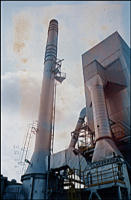Mercier - In a letter dated August 26 sent to the Premier of Quebec, John Charest, the Mercier Decontamination Coalition again asks the government to proceed to set up an independent program of supervision of toxic emissions from the Clean Harbors incinerator that has already begun burning toxic sludge from Sydney, Nova Scotia.

The national Coalition, that icludes the organizations "Héritage Saint-Bernard, la coalition Décontamination-Mercier, le comité " Je bois clair ", et la Société pour Vaincre la Pollution (SVP)", says it's worried, among other things, about the composition of this waste which may contain heavy metals such as lead and arsenic. "Certain pieces of information lead us to suspect the presence of PCBs. This is why we feel that the ministry of the environment of Quebec should fully investigate the waste destined for Mercier", the spokesperson said.
The environmental group says that it is "convinced that the Clean Harbors (also known as Tricil-Laidlaw) incinerator can't incinerate such waste without releasing toxins to the environment of Mercier, its population and its agricultural industry. "Our concerns are not only about transmission to the atmosphere of heavy metals, dioxins, furans and PAHs, of which several are carcinogenic , but equally the disposal of the ashes often more toxic than the initial waste."
The Coalition can't understand why the waste of the Sydney Tar Ponds are not treated on location, with more advanced technologies that are safer and more efficient. "The negative impacts of the incinération of such waste has already been shown. It is now time to look at the newer chemical or mechanical/chemical treatments, and temporary installations that can be dismantled once the remediation takes place. Thus every community touched by the presence of toxic waste will be in a position to regulate its own problem rather than passing it on to another community",
notes the organization that considers that the Mercier region has suffered enough, after 35 years of contamination, and that Mercier was promissed not to have to endure any further pollution risks. " Why should the population of Mercier region, beset with the most serious ecological catastrophe of the Quebec, accept the waste of the worse ecological catastrophe of Canada? Where will the other 700,000 tonnes of waste oil and toxic sludge of Sydney's contaminated site go? "
The Coalition reminds the premier of his promisses with regard to the remediation of the Mercier region, in addition to the treatment of soil and groundwater already recommended in a 1994 report of the BAPE commission that still lies on the desk of Quebec's ministry of the environment.
Copies of this letter were also sent to the minister of the environment of the Quebec, Thomas Mulcair, and to Châteauguay's representative and minister of the Municipal Affairs, John Marc Fournier.